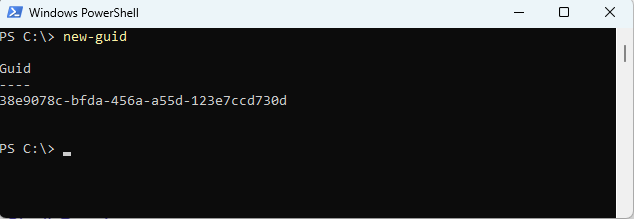GUIDs (Globally Unique Identifiers) are widely used in software development to ensure uniqueness across distributed systems, databases, and applications. One of their primary use cases is in database management, where they serve as primary keys instead of auto-incremented integers. This is particularly useful in distributed databases, where multiple servers generate unique IDs without requiring coordination. GUIDs are also used in security applications, such as session tokens, API keys, and cryptographic identifiers, to ensure that identifiers remain unique and unpredictable. Furthermore, they are essential in scenarios involving data synchronization, as they prevent conflicts when merging records from multiple sources.
Generate GUID in programming languages:
C#
using System;
Guid guid = Guid.NewGuid();
Console.WriteLine(guid);
Java
import java.util.UUID;
UUID uuid = UUID.randomUUID();
System.out.println(uuid);
Python
import uuid
guid = uuid.uuid4()
print(guid)
JavaScript (Node.js)
const { v4: uuidv4 } = require('uuid');
console.log(uuidv4());
JavaScript (Browser)
crypto.randomUUID();
C++ (Using Boost)
#include <boost/uuid/uuid.hpp>
#include <boost/uuid/uuid_generators.hpp>
#include <boost/uuid/uuid_io.hpp>
#include <iostream>
int main() {
boost::uuids::uuid guid = boost::uuids::random_generator()();
std::cout << guid << std::endl;
return 0;
}
Go
package main
import (
"fmt"
"github.com/google/uuid"
)
func main() {
guid := uuid.New()
fmt.Println(guid)
}(Requires to get github.com/google/uuid)
Swift
import Foundation
let guid = UUID().uuidString
print(guid)
Kotlin
import java.util.UUID
fun main() {
val guid = UUID.randomUUID()
println(guid)
}
PHP
<?php
echo uniqid('', true);
?>
Ruby
require 'securerandom'
puts SecureRandom.uuid
Rust
use uuid::Uuid;
fn main() {
let guid = Uuid::new_v4();
println!("{}", guid);
}
(Requires uuid crate: cargo add uuid --features v4)
Beyond databases, GUIDs are commonly used in software development for uniquely identifying objects, files, and system components. In Windows, for example, COM (Component Object Model) uses GUIDs to identify interfaces and components, allowing different applications to communicate seamlessly. In cloud computing, GUIDs help track resources, such as virtual machines, containers, and storage objects, across large-scale distributed environments. They are also crucial in versioning systems, ensuring that each commit or change has a unique identifier. By leveraging GUIDs, developers can create robust and scalable applications without worrying about ID collisions or duplication issues.
SQL
SELECT NEWID(); -- Generates a random GUID
SELECT NEWSEQUENTIALID(); -- Generates a sequential GUID (only works inside a default constraint)
MySQL
SELECT UUID(); -- Generates a random UUID
SELECT UUID_SHORT(); -- Generates a shorter, numeric version of a UUID
PostgreSQL
SELECT gen_random_uuid(); -- Requires the "pgcrypto" extension
-- Enable the extension if not already enabled: CREATE EXTENSION IF NOT EXISTS "pgcrypto";
Oracle
SELECT SYS_GUID() FROM DUAL;
SQLite
SELECT lower(hex(randomblob(16))) || '-' ||
substr(lower(hex(randomblob(2))),1,4) || '-' ||
substr(lower(hex(randomblob(2))),1,4) || '-' ||
substr(lower(hex(randomblob(2))),1,4) || '-' ||
lower(hex(randomblob(6))) AS guid;
Generade GUID in PowerShell
Open Microsoft PowerShell on your computer, type 'new-guid' command

More About GUIDs
Globally Unique Identifier - Wikipedia
GUID Structure - Microsoft
RFC 4122
guid generator, uuid generator, create guids, online guid, online guid generator, globally unique identifier, universal unique identifier, java guid, java uuid, C# guid, C# uuid, globally unique identifier, unique identifier
